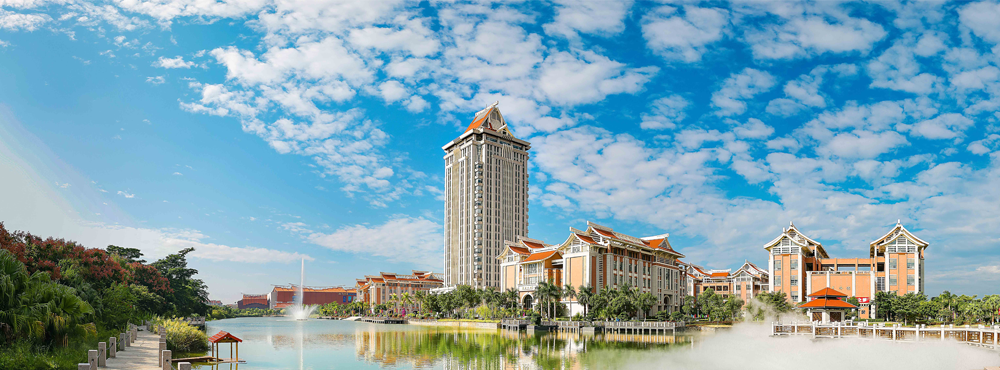

Jimei University (JMU), located in Xiamen, Fujian Province, is a “Double First-class” provincial university jointly constructed by the Ministry of Transport and Fujian Province, the Ministry of Natural Resources and Fujian Province, as well as Fujian Provincial Government and Xiamen Municipal Government. It offers doctoral programs and master programs exempted from admission examinations. It is the only qualified institution on the mainland rectified by the Maritime Bureau of the Ministry of Transport to train Taiwan seafarers.
With a history of 106 years, the origin of JMU can be traced back to Teachers’ Department of Jimei School (1918) and the Aquatic and Business Departments of Jimei School (1920), both of which were founded by Tan Kah Kee, a renowned overseas Chinese patriotic leader. In 1994, Jimei Teachers College, Jimei Navigation College, Jimei College of Finance and Economics, Xiamen College of Fisheries and Fujian College of Physical Education were merged into JMU. In 2004, the former Xiamen School of Industry was also included in the merge. With the school motto of “Sincerity and Perseverance”, Jimei University adheres to the philosophy of “establishing the University with Tan Kah Kee spirit, and fostering talents with sincerity and perseverance” in the long-term practice of school-running. Hence it has enjoyed wide reputation at home and abroad.
Since the inception of the School Board of JMU in 1996, Xi Jinping, He Guoqiang, Chen Mingyi, Lu Zhangong, Huang Xiaojing and Wang Yifu have presided as the Chairmen successively. The current consultants of the Board are Jia Qinglin and Chen Yongzai. From 1999 to 2002, when serving as Chairman of the Board during his term as Governor of Fujian Province, General Secretary of CPC Central Committee, Xi Jinping paid seven visits to JMU, providing significant instructions which laid a solid foundation for the development of the University and its future transformations.
With 20 colleges and schools, JMU boasts a total enrolment of more than 30,000 students: over 26,700 full-time undergraduates, 3,100 postgraduates and nearly 200 international students. It currently has a faculty of about 1,500 full-time teachers, including 10 academicians, 36 national top-level talents, 283 high talents at both the provincial and ministerial levels, and 400 talents at the municipal and departmental levels.
JMU offers an extensive range of undergraduate and postgraduate programs which provide an extraordinary learning experience, covering 10 disciplines such as Economics, Law, Education, Literature, Science, Engineering, Agriculture, Management, Arts, and Cross-disciplines. Three disciplines including Botany and Zoology, Engineering and Agricultural Science are ranked in the global top 1% of ESI (Essential Science Indicators). It offers 4 authorized first-level discipline doctoral programs, 15 authorized first-level discipline master programs and 19 authorized master programs (categories). There are 8 key disciplines in Fujian Province (including 2 specialized key disciplines) and 2 mobile postdoctoral research stations in the Aquatic discipline and Shipping and Ocean Engineering discipline. The Shipping and Ocean Engineering and Aquatic Sciences were elected as “Double First-class” construction disciplines in Fujian Province. The Shipping and Ocean Engineering Discipline Group and Aquatic and Food Engineering Discipline Group entered the list of “peak disciplines” in Fujian Province. Shipping and Port Logistics Discipline Group, Regional Economy and Management Discipline Group, Fujian-Taiwan Sports and Culture Discipline Group, and Mathematics and Science Discipline Group have also been enlisted as “plateau disciplines” of Fujian Province.
Currently, there are 77 undergraduate programs, including 4 state-level specialties, 25 state-level first-rate undergraduate programs, 6 state-level “excellence” talent training programs, 3 state-level professional comprehensive reform pilot projects, 4 engineering education programs certified by the Ministry of Education, 6 second-level teaching education programs authenticated by the Ministry of Education, 24 provincial first-class major programs, 11 provincial specialties programs and 11 provincial comprehensive reform pilot major programs, 8 provincial specialties programs with service industry characteristics, and 6 provincial innovation and entrepreneurship education reform pilot programs. There is 1 national teaching team, 2 national experimental teaching demonstration centers, 1 national virtual simulation experimental teaching center, 1 national practical education base for college students, 12 provincial teaching teams, 16 provincial experimental teaching demonstration centers, and 4 provincial virtual simulation experimental teaching centers. As an important base for cultivating senior navigation professionals in China, JMU boasts the world’s largest vessel for training and practice, “Yude” which weighs 64,000 tons.
JMU boasts 1 national key laboratory (co-constructed), 2 state-province joint engineering research centers, 19 science and technology innovation platforms at the provincial (ministerial) level, 5 provincial collaborative innovation centers, 2 provincial new think tanks with university specialty, 21 provincial university scientific research innovation platforms or research bases, 10 provincial-level science and technology innovation teams of universities. Besides, JMU has undertaken a number of key projects of the Ministry of Science and Technology (including the former National 973 Project, National 863 Project, National Key R&D Program, etc.), key projects of the National Natural Science Fund, key projects of the National Social Science Fund, and other national projects. Research excellence has won 156 scientific and technological awards at and above the provincial and ministerial levels. Capitalizing on the advantage of the characteristics of “engineering integrated with marine science”, JMU has expanded its community services, contributing greatly to the development of national and local construction. It has collaborated with nearly 1,000 enterprises and institutions in industry, education and research.
JMU has committed itself in its global engagement. Located in Xiamen, the core area of the “Maritime Silk Road”, it has been devoted to serving “the Belt and Road” initiative and the construction of the innovation base of the BRICS New Industrial Revolution Partners. In addition, accredited as a BRICS demonstration base, JMU was elected into the first council of Industry Innovation Alliance of BRICS Partner Innovation Center, China-Arab Universities 10+10 Cooperation Program and “the 21st Century Maritime Silk Road” University Alliance, etc. and spearheaded the establishment of Eels Industrial Technology Innovation Strategy Alliance among “the Belt and Road” countries. JMU has partnered with more than 130 world-renowned universities and research institutions around the world, carrying out academic exchanges and cooperation with the International Maritime Organization (IMO), the International Association of Maritime Universities (IAMU) and the International Association of Marine Aids to Navigation and Lighthouse Authorities (IALA). ASEAN Education Center of JMU in Bangkok, Thailand has been set up as well. Since two Sino-foreign cooperation programs were approved, more than 6,000 graduates of 17 classes have been fostered so far. Thanks to the innovative “the Belt and Road” international talents training project launched by both JMU and enterprises, the first cooperative training program for African (Angola) talents has successfully been implemented. As a strategic partner of the Ministry of Education (China) Service Center for Studying Abroad, JMU is one of the earliest institutions certified by the Ministry of Education to admit students from Taiwan, Hong Kong, Macao, overseas Chinese and foreign students. It also enrolls the recipients of “Fujian Provincial Government Scholarship for International Students” and “Xiamen Tan Kah Kee Scholarship”. Furthermore, it has been set up as a study tour base for Taiwan youths in Fujian Province and Jimei District, a subsidized school of the “Two-way Exchange Program for Youth on the Mainland” by the Government of the Hong Kong SAR, as well as one of the first “Overseas Chinese Education Bases” in Fujian Province.
JMU covers a total area of about 1.57 million square meters (2344 Chinese mu) with a construction area of 1.03 million square meters. Eight Tan Kah Kee buildings with their distinctive architectural features have been rated as national cultural relics. The architecture complex of the new campus was awarded as one of the “100 Classic and Top-quality Projects for the 60th Anniversary of the Founding of People’s Republic of China”. JMU has access to a 10 Gigabit high-speed campus network. The library houses a collection of more than 3.45 million volumes of documents and nearly 1,000 journals in Chinese and foreign languages, more than 15 million e-books and 30,000 e-journals. 65 databases in Chinese and foreign languages have been introduced and 5 databases have been set up to meet the needs of teaching and research.
集美大学地处福建省厦门市,是福建省“双一流”建设高校,是交通运输部与福建省、自然资源部与福建省、福建省与厦门市共建高校,博士学位授予单位,硕士推免生资格单位,大陆唯一获交通运输部海事局批准具有开展台湾船员适任培训资格的院校。
学校办学始于著名爱国华侨领袖陈嘉庚先生1918年创办的集美学校师范部和1920年创办的集美学校水产科、商科,迄今已有106年历史。1994年,集美师范高等专科学校、集美航海学院、集美财经高等专科学校、厦门水产学院、福建体育学院合并组建集美大学。2004年,原厦门市工业学校成建制并入。学校以“诚毅”为校训,在长期办学实践中坚持“嘉庚精神立校,诚毅品格树人”,在海内外享有广泛声誉。
学校于1996年成立校董会,习近平、贺国强、陈明义、卢展工、黄小晶、汪毅夫等担任过校董会主席,现任校董会顾问为贾庆林、陈永栽。1999年至2002年,习近平总书记在任福建省省长期间担任集美大学校董会主席,先后7次到学校指导工作并提出系列重要指示,为集美大学的发展打下了坚实的基础并为未来的改革发展指明了方向。
学校设有20个学院,在校生30000多人,其中全日制本科生26700多人,研究生3100多人,国际学生近200人。现有专任教师1500人左右,拥有院士10人、国家级高层次人才36人次、省部级高层次人才283人次、市厅级高层次人才400人次。
学校学科门类较为齐全,涵盖经济学、法学、教育学、文学、理学、工学、农学、管理学、艺术学、交叉学科等10个学科门类。植物学与动物学、工程学、农业科学3个学科进入ESI全球前1%。现有一级学科博士学位授权点4个、一级学科硕士学位授权点15个、硕士专业学位授权点(类别)19个。拥有福建省一级重点学科8个(其中特色重点学科2个),水产、船舶与海洋工程2个博士后科研流动站。船舶与海洋工程、水产入选福建省“双一流”建设高校主干学科,船舶与海洋工程学科群、水产与食品工程学科群入选福建省高峰学科,航运与港口物流学科群、区域经济与管理学科群、闽台体育文化学科群、数理学科群入选福建省高原学科。学校现有本科专业77个,其中国家级特色专业4个、国家级一流本科专业建设点25个、国家级“卓越”人才培养计划专业6个、国家级专业综合改革试点项目3个、教育部工程教育认证专业4个、教育部师范类专业第二级认证6个、省级一流专业建设点24个、省级特色专业建设点和省级专业综合改革试点各11个、省服务产业特色专业8个、省创新创业教育改革试点专业6个。拥有国家级教学团队1个、国家级实验教学示范中心2个、国家级虚拟仿真实验教学中心1个、国家级大学生校外实践教育基地1个、省级教学团队12个、省级实验教学示范中心16个、省级虚拟仿真实验教学中心4个。作为培养我国高级航海人才的重要基地,学校拥有目前世界上最大的教学实习船——“育德”轮,总载重达6.4万吨。
学校现有全国重点实验室(共建)1个、国家地方联合工程研究中心2个、省(部)级科研创新平台和人文社科研究基地19个、省级协同创新中心5个、省级高校特色新型智库2个、省级高校创新平台/研究基地21个、省级高校科技创新团队10个。先后承担了一批国家科技部重点项目(包括原国家973项目、国家863项目、国家重点研发计划项目等)、国家自然科学基金重点项目、国家社会科学基金重大项目等国家级课题的研究任务,研究成果获省部级及以上科技奖励156项。学校以“工海”特色为优势,不断拓展社会服务的形式和领域,积极为国家和地方社会建设发展贡献力量,与近千家企事业单位建立了产学研合作关系。
学校积极推进新时期教育对外开放,充分发挥地处“海上丝绸之路”核心区厦门的区位优势,积极服务国家“一带一路”倡议和参与金砖国家新工业革命伙伴关系创新基地建设,被授予金砖示范单位,并入选金砖国家新工业革命伙伴关系创新基地产业创新联盟、中阿高校10+10合作计划和“21世纪海上丝绸之路”大学联盟等,牵头发起成立“一带一路”国家鳗鲡产业技术创新战略联盟。已与全球130多所知名大学和科研机构建立了友好合作关系,与国际海事组织(IMO)、国际海事大学联合会(IAMU)、国际航标协会(IALA)等开展学术交流与合作。在泰国曼谷设立集美大学东盟教育中心。获批2个中外合作办学项目,迄今已培养17届6000余名毕业生;创新性开展校企“一带一路”国际人才联合培养并完成首届非洲(安哥拉)人才培养计划。学校是亚洲航标培训基地,是教育部(中国)留学服务中心战略合作伙伴单位,是经教育部批准较早具有招收台港澳侨学生和外国留学生资格的院校之一,是福建省政府来华留学生奖学金和厦门市陈嘉庚奖学金招生单位、福建省及集美区台湾青少年研学旅游基地、香港特区政府“青年内地双向交流计划”资助单位,是福建省首批“海外华文教育基地”。
学校总占地面积2344亩,校舍建筑面积约103万平方米,校园建筑特色鲜明,有8栋嘉庚建筑为国家级重点文物保护建筑,新校区建筑群荣获“新中国成立60周年百项经典暨精品工程”。学校建有万兆高速校园网,图书馆现有馆藏纸质文献345万余册,中外文纸质现刊近千种,电子图书1500万多册,电子期刊3万余种。引进中外文数据库65个,自建特色数据库5个。
